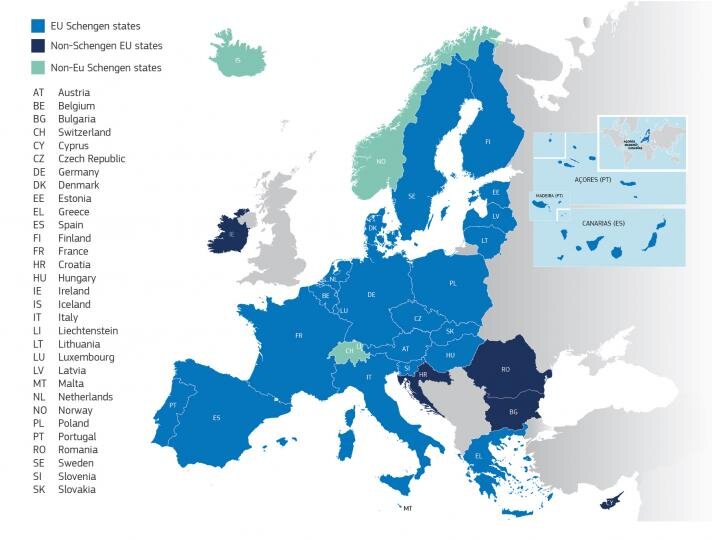The Schengen Visa - Travelling throughout Europe
The Schengen Visa.
The Schengen Visa, also known as a Tourist Visa, is a short-stay permit that allows applicants to travel to any European Union or non-EU member of the Schengen area, for up to 90 days for tourism or business intentions, without restrictions, as there are no border controls within the Schengen Zone.
One of the most common visas for Europe, the Schengen Visa enables the holder(s) to enter and free travel throughout the Schengen area in any of the Schengen member states.
The Schengen Visa is not suitable for individuals who are planning to study, work or live in one of the Schengen countries for more than 90 days. Instead, you will need to apply for a national visa for that European country.
The Schengen Visa is an authorisation issued by a Schengen State with a intention to:
An intended stay in the territory of the Schengen States for a duration of no more than 90 days in any 180 days period, a short-stay visa.
Transit through the international transit areas of airports of the Schengen States, airport transit visa.
Who needs the Schengen Visa?
Residents of non-EU countries, that do not have a visa-liberalization agreement with the Schengen member states, will need to obtain a Schengen Visa prior to their arrival in Europe.
European countries that issue the Schengen Visas.
Schengen Europe includes 26 countries, ‘Schengen States’, without border controls between them.
These countries include:
Austria.
Belgium.
Czech Republic.
Denmark.
Estonia.
Finland.
France.
Germany.
Greece.
Hungary.
Iceland.
Italy.
Latvia.
Liechtenstein.
Lithuania.
Luxembourg.
Malta.
Netherlands.
Norway.
Poland.
Portugal.
Slovakia.
Slovenia.
Spain.
Sweden.
Switzerland.
The Schengen area and the Schengen states.
Image source: Europa.eu
Documents and requirements.
You will have to present several documents at the Schengen port of entry, in order to be permitted to enter, if you are a non-EU/Schengen country national, regardless if you are a visa-exempt or not.
The documents you need to provide when entering the Schengen Area are as follows:
Valid Passport. Issued within the previous 10 years and valid for at least 3 months after the date you intend to leave the EU.
Schengen Visa. If you are a national of one of the third countries in need of a visa.
EU/Schengen border officials may also ask for other information and documents such as sufficient funds, proof of accommodation, how long you intend to stay, round-trip airline ticket, the purpose of your entry, travel insurance, invitation letter, etc.
Make sure that the border officer provides you with an entry stamp in your passport when you enter the Schengen area. Without a stamp, you could be fined or detained.
Visiting Europe.
It is necessary to apply for a Schengen Visa if you are required to visit one or more European countries, for any of the following reasons:
Business purposes.
Visiting friends and family.
Tourism and holidays.
Cultural and sports events.
Airport transit and transit for seafarers.
Official visit.
Medical reasons.
Short-term study and research purposes.
The Schengen consulate can issue you a single-entry visa, double-entry visa, or multiple-entry visa depending on the frequency of your visits.
If frequent travel is required, then you may be able to apply for a EU visa valid for up to 5 years. However, keep in mind that you cannot stay within the Schengen area for more than 90 days in a 180-day period of time.
Applying for a visa to enter Europe?
Applying for a Schengen Visa to travel through Europe requires you to first determining whether you need one or not depending on the purpose of your travel and nationality.
When applying for the visa, you will have to organise your travel plan, how many days you plan to be in the zone, the countries you are going to visit if more than one, the country where you are going to enter, and the country where you’re going to exit.
Once you have determined all of the above, you will then need to review all the Europe visa application requirements you need to fulfil and start the process of setting up a visa appointment at one of the Schengen consulates in your country.
OUR SERVICES
CONVEYANCING.
Need help to purchase a lovely property or seeking to sell your small business?
NON-RESIDENT TAX.
Fancy visiting Spain a few times throughout the year?
WILLS & INHERITANCE.
Peace of mind can do so many wonders for all of those who you love. A Spanish will can help a family endure less pain & aggravation.
HEALTH INSURANCE.
Sometimes, you just that extra protection, no matter your age or circumstance. You never know what could happen.
HOME INSURANCE.
Occasionally, leaving your home unprotected doesn’t just put your possessions at risk, but also your memories.
COMPANY FORMATIONS.
Living in Spain is great, and owning your own business is amazing. Spain is open for business.
ACCOUNTING.
Numbers are good, especially when your business generates much profit.
RESIDENT APPLICATIONS.
Take the chance and move to Spain. Live a new life with so many new opportunities.
SPANISH GOLDEN VISA.
Looking for an opportunity to invest in living? A Spanish Golden Visa is the key for you to expand your life.
CONNECT WITH US
Feel free to ask us any legal or fiscal questions. You are more than welcome to also email or call us.











The Spanish tortilla is a traditional omelette and is an essential part of modern Spanish cuisine made with eggs, potatoes, and onions, but it can be served in a variety of ways..